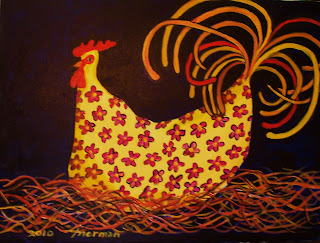
My long suffering wife, who (I believe) loves me as much as she can, said, "I think painting is a good hobby for you." As soon as I heard that word "hobby" it felt a little like I'd stepped on a shard of glass barefooted. Hobby? Is what I do a hobby?
Is what I do a hobby?
Does it matter? Why do I feel an aversion to the word?
The definition of a hobby is an activity or interest that is undertaken for pleasure or relaxation. The activity is done for pleasure and relaxation and not for financial gain. Obviously a hobby might produce something that can be sold, and money can accumulate, but the reason one engages in the hobby is not to earn a living, it is to enjoy living.
Often I tell people that when I paint I zone out, it is like medication, self-hypnotism, it creates in me a sort of Buddhist calm, and since I have been, for years depressed and stressed, it seems prudent for me to involve myself in some activity that clears my mind of distractions, and focuses me on the moment only. When I paint, I forget time. When I paint the television becomes a talking lamp, the coffee in my cup goes untouched and grows cold. I work a late shift so I set the alarm on my cell phone to go off at 1:45 pm. This reminds me to stop painting and get ready to go to work. Without the alarm I could easily be late to work. When I paint, time ceases to exist, or at least time ceases to matter.' When I paint what matters is the painting.
Sometimes friends will ask me to paint something particular. Often they want a portrait of their dog, or a likeness of their dead mother. I have stopped taking such commissions. I've done it in the past and sometimes I've been successful, and sometimes not. The thing is, if I take a commission then suddenly I have to paint something that pleases someone else, someone who likely has a preconceived idea of what they want. I have no problem having someone say, "I like that picture, how much would you take for it." The picture is done. If someone wants to buy something already done, something that appeals to them, then fine. At no point was that picture painted to please that buyer, it was painted because I wanted to paint it. If I have an order to fill then the benefits of painting is, for me, diminished.
Sometimes, once I have finished a painting, I'll look at it and decide it sucks like a vacuum cleaner. Because I am struggle financially, I will often decide to paint over the sucky picture with primer and try again. Why waste a canvas? Nevertheless, even when I paint a picture and feel my efforts have failed, I still benefited from the painting. I enjoy painting a bad picture as much as I enjoy painting a good picture. Of course I don't enjoy looking at a failed end product, the action of painting did not fail.
Again, this all sounds like what I do is a hobby. It sounds like I paint because it helps me, pleases me, relaxes me, and I don't do it to make money. So what's wrong with calling it a hobby?
I guess I have this assumption that something done for money is serious and something done for pleasure and relaxation is trivial. If what I do is considered a hobby by other people then they are not going to honor my sacrifice of time on the altar of hobby.
When I looked at the origins of the word Hobby I found that the roots of the word go way back and are linked to our childhood toy, the hobby horse. Actually the toy's name goes back even further, perhaps to medieval days when a small horse (13 to 14 hands which is about 52 to 56 inches, or 130 to 140 centimeters) was bred for soldiers called Hobelars. The HOBBY was the name given to these small skirmishing horse. Since that horse was small, it made since to call the child's toy horse, a Hobby Horse. The Hobby Horse could actually be ridden, and it was fun to ride, but it took you nowhere. In a similar way our hobbies are real activities, they are fun to do, but the fun, and the doing is the purpose of that activity.
Well, maybe the purpose of my painting is not getting rich and famous, but it is more than a hobby to me. I need another category. I need to find another term. There are, I guess, passive hobbies and obsessive hobbies. What I do matters to me, and people who care about me MUST honor my devotion to painting. If you want to have a relationship with me, then part of me is my need to paint every day. (I also write every day.)
Yes, I miss days sometimes. My son recently got his PHD at Princeton, and my wife and I flew up there and spent 4 days with him. I didn't paint. I did bring a sketch pad, and I did sketch when I had time, but I didn't paint. I will still go shopping with Kathie, and make trips to the grocery store. I still mow the grass. I am not demanding that ONLY my needs matter. While Kathie has a relationship with me, I also have a relationship with her. I honor what matters to her.
I just hate calling what I do a hobby. I've read that Vincent Van Gogh only sold one painting during his life time. Does that mean Van Gogh was just a hobbyist painter? Painting is part of who I am, and that means the value of painting is linked to my value as a human being.












